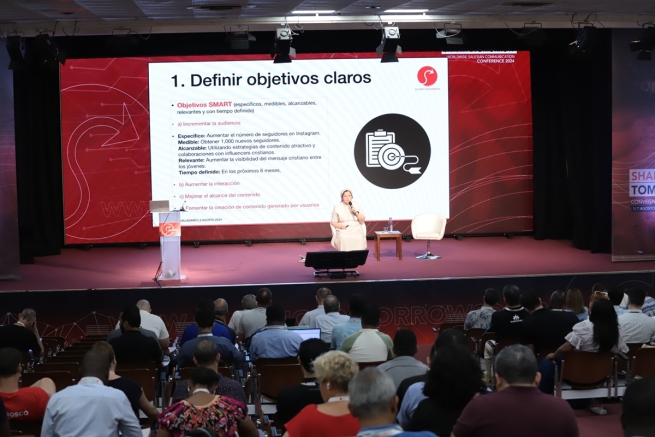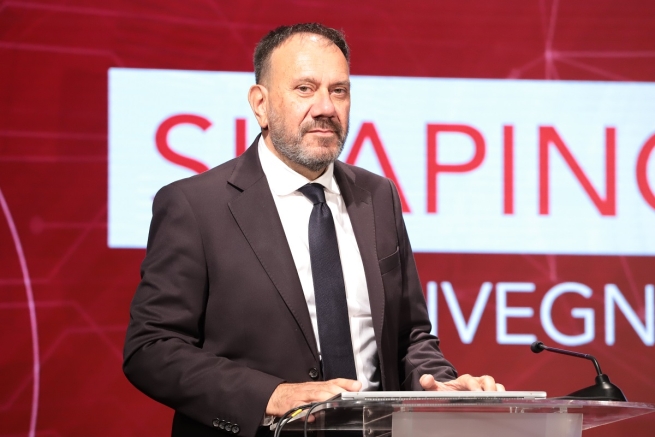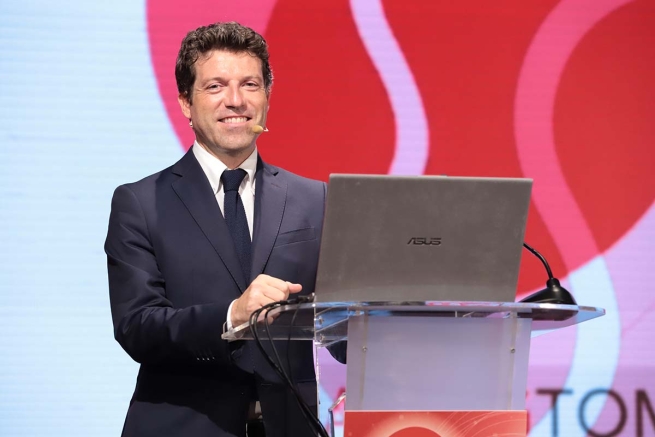NEWS PHOTOS
Rome, Italy - Aug. 3, 2024 - "Ten good practices of evangelization in social networks, of which the last one is the best": with this catchy beginning Sister Xiskya Valladares returned to the stage of the World Social Communication Conference "Shaping Tomorrow," underway in Rome (Aug. 1-7) to offer in a quick, clear and entertaining way some tricks to be effective in evangelizing and educational communication on the web. Among her suggestions: set relevant and defined goals; know your intended audience well; create relevant and specific content for that audience; have a project mentality, plan and schedule content; capture the audience's attention from the start; optimize content for each platform; keep interaction high with a "call to action" and immediate response to comments; measure and analyze the performance of your actions, and refine your strategy accordingly; take advantage of user-generated content; and finally - most important - take care of Eucharistic life.
Rome, Italy - 2 August 2024 - The last session of the first day of work at "Shaping Tomorrow", the World Conference on Social Communication promoted by the Salesian Congregation's Social Communication Sector and the Salesian Pontifical University's Faculty of Social Communication, featured journalist Maurizio di Schino, who spoke on the theme: "communicating with migrants and refugees". The speaker, who himself, as a boy with his family, experienced the experience of being a migrant, urged those present not to recount migrations as "emergencies, since they are part of our history" and called for the responsible use of words, also providing some texts and deontological references for communicators. Then, referring to his direct experiences in the field, he also emphasized the need to tell migration stories by empathizing with migrants and refugees, because such an attitude makes it possible to discover relationships and connections in reality that otherwise would not be seen.
Rome, Italy - 2 August 2024 - The activities of the World Conference on Social Communication "Shaping Tomorrow" kicked off in the afternoon of the first day, Friday 2 August, with a captivating talk by Sister Xiskya Valladares, a Religious of the Congregation of the Purity of Mary, and co-founder of the digital evangelisation project "iMisión". Also speaking before the Secretary of the Vatican's Dicastery for Communication, Bishop Lucio Adrian Ruíz, the nun conducted a pleasant interaction with the audience, emphasising that "if we want an adolescent to understand us, without losing our identity, we have to embrace their language". On the strength of her 14 years as a "digital missionary" and her experiences on various social networks, Sister Valladares first highlighted some traits of the young people of "Generation Zeta": for example, that they are not really passive, but demanding; that they seek spontaneity understood as authenticity; or that they have a desire for immediate answers. He then indicated some of the techniques and paradigms needed to intercept them on the social networks: understanding the network as a space for conversation; developing creativity to the utmost; gamifying evangelisation (carrying it out in a playful manner); knowing how to fit in with viral trends; or, again, putting one's feelings and emotions into play. All this, not to get a few more 'likes', but to achieve a real involvement of one's followers, and to succeed in the end in really reaching people's hearts.
Rome, Italy - 2 August 2024 - In the second working session of the World Social Communication Conference "Shaping Tomorrow", Fabio Bolzetta, journalist and President of the Italian Association of Catholic Webmasters (WECA), offered some examples of changes in the field of communication that are taking place in Italy and that can be taken as a model because they will take place, perhaps with different modalities and timing, in the rest of the world. He illustrated the differences in audiences between the information enjoyed by traditional media (mostly adults) and digital media (young people) - and the dangers of digital information that often depends on algorithms (for certain social networks and apps) or is mediated and interpreted not by professionals but by influencers with their own motivations and interests. "There has never been a time in history when it has been so easy, simple, possible, free, immediate, to communicate... yet we live in a period of intergenerational incommunicability," he further observed, also accompanying the listeners in recognising the opportunities that have developed since web 2.0 and today with the increasingly evident spread of Artificial Intelligence. In the face of the challenges identified, the speaker recalled the centrality of certain values for those who perform the mission of communication: authenticity, authority, awareness, instantaneity, competence, constancy and collaboration.




